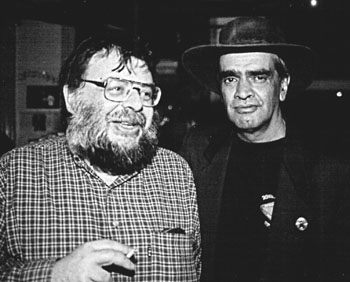Australia’s political prisoners
A short documentary has appeared on the internet about Scott Parkin, the nonviolent US peace activist who in 2005 was detained in Australia for 5 days and then deported for being a 'direct or indirect risk to Australian national security.' Greenpeace Australia's communications director, Dan Cass, is depicted describing Parkin as Australia's first political prisoner.
The real reasons for Parkin's detention and expulsion have yet to be disclosed, but it would nonetheless appear reasonable to conclude he was a political prisoner, someone "imprisoned for their political beliefs or actions." But was he the first in Australia?
 Albert Langer immediately comes to mind (pictured, on the left). The veteran leftie activist was gaoled in 1996 for nonviolently advocating a method of voting that refuses to allocate preferences.
Albert Langer immediately comes to mind (pictured, on the left). The veteran leftie activist was gaoled in 1996 for nonviolently advocating a method of voting that refuses to allocate preferences.
Voting is compulsory in Australia and voters can rate candidates in order of preference. That way you can vote for minor parties without 'wasting' your vote.
It can be difficult, I admit, to decide whether to put the "More Guns Party" or the "Revive White Australia Party" last on one's ballot paper, but Langer didn't want to give a preference to a major party either; he wanted to vote 1, 2, 2, 2, and so on (since dubbed a "Langer vote"). In a secret ballot, he can vote how he likes — and indeed at the time, his was a formal or valid vote — but it is an offence in Australia to advocate voting with anything other than consecutive and unrepeated numbers.
At the time, freedom of expression had only 'implied' constitutional protection in Australia. (Even today, the explicit guarantees of Victoria's Charter of Rights and Responsibilities would be trounced by the Commonwealth Electoral Act.) Langer was sentenced to 10 weeks' gaol which would have kept him safely out of the way until 28 days after the election then being fought in the state of Victoria.
Australia's Human Rights and Equal Opportunity Commission supported Langer's appeal against the severity of his sentence, arguing that the 'mischief' he was causing justified his imprisonment only until the election (some 17 days) and not beyond.
Amnesty International, however, issued an Urgent Action from London calling for his immediate and unconditional release:
"We find it difficult to comprehend why the Australian Electoral Commission on the one hand declares as acceptable the optional form of voting advocated by Albert Langer, while on the other hand initiates legal action . . . Amnesty International believes that Albert Langer's imprisonment is a direct result of the exercise of his right to freedom of expression."
In the end, Langer was held until election night.
Amnesty described Langer as Australia's first prisoner of conscience in "over 20 years," leaving open the question of who, in the early 1970s, was "imprisoned for their political, religious or other conscientiously held beliefs, or by reason of their ethnic origin, sex, colour, language, national or social origin, economic status, birth or other status who have not used or advocated violence" (Amnesty's definition of a prisoner of conscience).
Perhaps they mean conscientious objectors (Simon Townsend?), or anti-war protestors (forerunners to Scott Parkin). Or countless indigenous Australians locked up for being black.
Readers might be able to come up with other examples from the '70s and before. I welcome your comment.
Incidentally, if you're an Australian of a certain age, and you think that, like Scott Parkin and Gary Foley (pictured above, right), you might have an ASIO file, anything older than 30 years is publicly available on application to the National Archives of Australia. Start by clicking on "Record search" (top right) . . .

Geoffrey Robertson cites the Tolpuddle Martyrs, “the embryonic trade unionists who were convicted in Dorset in England for swearing a secret oath and transported to Botany Bay in 1834,” as Australia’s “most celebrated non-Irish political prisoners.”
The Statute of Liberty: How Australians can take back their rights (Vintage, Sydney 2009) p85
I have just started an discussion on the need for a new definition of political prisoner where i said;
In April 2011, the European Union decided that it should have its own definition of “political prisoner”.
assembly.coe.int/Documents/WorkingDocs/Doc11/EDOC12587.pdf
The Australian government does not a definition of what is a political prisoner either. What the Australian Government does have, is a policy of mandatory detention where a refugee has “illegally” arrived by boat. http://www.immi.gov.au/media/fact-sheets/82detention.htm Some of these refugees have been detained for up to 7 years. If the Australian Government has created mandatory imprisonment as a political tool to deter “illegal” entry as part of its policy, have they thus made those in mandatory detention “political prisoners”?”
The discussion can be found on this link
http://www.flickr.com/groups/global_photojournalism_news_protest_and_culture/discuss/72157629267543329/